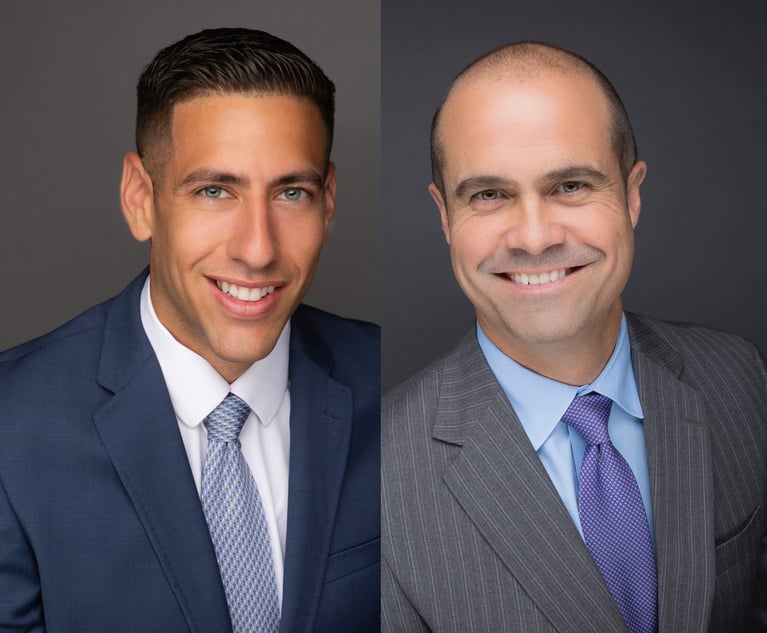Employee Compensation During Emergency Shutdowns: Pay or Not Pay?
n the middle of one of the worst hurricane seasons in recorded history, we have been receiving questions across our offices about how to handle pay for emergency shutdowns in the middle of a day, extended company closings, and planned or unplanned late openings.
October 04, 2017 at 12:48 PM
4 minute read
 John W. Hargrove, Bradley Arant Boult Cummings partner and chair of the labor and employment practice group.
John W. Hargrove, Bradley Arant Boult Cummings partner and chair of the labor and employment practice group.
In the middle of one of the worst hurricane seasons in recorded history, we have been receiving questions across our offices about how to handle pay for emergency shutdowns in the middle of a day, extended company closings, and planned or unplanned late openings. With ice storm and blizzard season around the corner, I will try to summarize some of these pay considerations. Always keep in mind the basic principle that employees always must be paid for all time actually worked.
Salaried Employees
Salaried employees, to retain their overtime exemption, must be paid their full salary in any week in which they perform any work. Thus, a closure for an approaching storm front or unusable work location will not allow an employer to deduct any percentage of a salaried employee's pay for the hours not worked.
There basically are three exceptions for inclement weather to this rule for salaried employees. First, if the employee has a paid-time-off (PTO) plan, the employer may require the employee to use some of his PTO time for a weather-related closure. In this instance, the salaried employee obviously continues to receive full pay (but some of it comes from the PTO bank). The second exception is that an employee need not be paid his salary in any work week in which no work is performed. This exception would apply to the more severe Harvey-like disasters. So, if the office is closed the entire week, an employer does not have to pay even exempt employees who performed no work. Finally, employers may deduct for full-day absences, but only full-day absences, if the business is open and the employee is unable to get to work due to the weather (this would be categorized as an unpaid personal day for something other than sickness or disability).
Hourly Employees
Pay for hourly employees during weather disasters is fairly simple. Hourly employees must be paid for all hours actually worked. If employees do not come in, are turned away at the door, or are sent home early, the rule is the same–pay hourly employees for hours actually worked.
Employers are not required to pay “show-up” pay under most state laws. These include the southern states. Some northeastern and western states do have show-up pay requirements contained in their state laws. Those laws should be checked if necessary for those requirements and any exceptions to them, such as exceptions that result from timely and effective notice of a closing by the company.
Working Remotely
As mentioned above, all employees, hourly and salaried, must be paid for all time worked. This includes time worked from home or any other offsite location. Employees with remotely logged-in computers, cellphones, and old-fashioned toolboxes must be monitored for actual work performed when the employer's business otherwise is closed.
In this age of working remotely, whether using new technology or just running old fashioned errands while the office is closed, employers must be careful with hourly employees. Hourly employees must be paid for all time actually worked, even when working away from the company's normally required time clock or log-in procedure.
Contractual Pay
In addition to considering federal and state wage-and-hour laws, contractual requirements could impose greater obligations on an employer. Individual employment contracts could contain such provisions, as could collective bargaining agreements (CBAs) in union settings. CBAs, for example, often contain show-up pay provisions and have restrictions on mandatory use of PTO.
Employees Who Work Even Though It's Not Required
Employees must be paid for all time worked. That is the rule no matter whether the employee was required to work or did so voluntarily. Additional payments or bonuses are allowed but not required. Of course, gifts and other forms of recognition also are allowed. Unfortunately, however, for the purpose of calculating overtime pay for hourly employees in a given work week, all remuneration must be included in the base rate before multiplying that rate by time and a half for hours worked over 40.
When in doubt, always start with the basic principles that hourly employees should be paid for all of their time worked and that salaried employees should be paid all of their full salaries unless a very narrow exception applies.
John W. Hargrove is a partner and chair of the labor and employment practice group at Bradley Arant Boult Cummings in Birmingham, Alabama. Contact him at [email protected].
This content has been archived. It is available through our partners, LexisNexis® and Bloomberg Law.
To view this content, please continue to their sites.
Not a Lexis Subscriber?
Subscribe Now
Not a Bloomberg Law Subscriber?
Subscribe Now
NOT FOR REPRINT
© 2025 ALM Global, LLC, All Rights Reserved. Request academic re-use from www.copyright.com. All other uses, submit a request to [email protected]. For more information visit Asset & Logo Licensing.
You Might Like
View All


Don’t Forget the Owner’s Manual: A Guide to Proving Liability Through Manufacturers’ Warnings and Instructions
5 minute read
Trending Stories
- 1Charlie Javice Fraud Trial Delayed as Judge Denies Motion to Sever
- 2Holland & Knight Hires Former Davis Wright Tremaine Managing Partner in Seattle
- 3With DEI Rollbacks, Employment Attorneys See Potential for Targeting Corporate Commitment to Equality
- 4Trump Signs Executive Order Creating Strategic Digital Asset Reserve
- 5St. Jude Labs Sued for $14.3M for Allegedly Falling Short of Purchase Expectations
Who Got The Work
J. Brugh Lower of Gibbons has entered an appearance for industrial equipment supplier Devco Corporation in a pending trademark infringement lawsuit. The suit, accusing the defendant of selling knock-off Graco products, was filed Dec. 18 in New Jersey District Court by Rivkin Radler on behalf of Graco Inc. and Graco Minnesota. The case, assigned to U.S. District Judge Zahid N. Quraishi, is 3:24-cv-11294, Graco Inc. et al v. Devco Corporation.
Who Got The Work
Rebecca Maller-Stein and Kent A. Yalowitz of Arnold & Porter Kaye Scholer have entered their appearances for Hanaco Venture Capital and its executives, Lior Prosor and David Frankel, in a pending securities lawsuit. The action, filed on Dec. 24 in New York Southern District Court by Zell, Aron & Co. on behalf of Goldeneye Advisors, accuses the defendants of negligently and fraudulently managing the plaintiff's $1 million investment. The case, assigned to U.S. District Judge Vernon S. Broderick, is 1:24-cv-09918, Goldeneye Advisors, LLC v. Hanaco Venture Capital, Ltd. et al.
Who Got The Work
Attorneys from A&O Shearman has stepped in as defense counsel for Toronto-Dominion Bank and other defendants in a pending securities class action. The suit, filed Dec. 11 in New York Southern District Court by Bleichmar Fonti & Auld, accuses the defendants of concealing the bank's 'pervasive' deficiencies in regards to its compliance with the Bank Secrecy Act and the quality of its anti-money laundering controls. The case, assigned to U.S. District Judge Arun Subramanian, is 1:24-cv-09445, Gonzalez v. The Toronto-Dominion Bank et al.
Who Got The Work
Crown Castle International, a Pennsylvania company providing shared communications infrastructure, has turned to Luke D. Wolf of Gordon Rees Scully Mansukhani to fend off a pending breach-of-contract lawsuit. The court action, filed Nov. 25 in Michigan Eastern District Court by Hooper Hathaway PC on behalf of The Town Residences LLC, accuses Crown Castle of failing to transfer approximately $30,000 in utility payments from T-Mobile in breach of a roof-top lease and assignment agreement. The case, assigned to U.S. District Judge Susan K. Declercq, is 2:24-cv-13131, The Town Residences LLC v. T-Mobile US, Inc. et al.
Who Got The Work
Wilfred P. Coronato and Daniel M. Schwartz of McCarter & English have stepped in as defense counsel to Electrolux Home Products Inc. in a pending product liability lawsuit. The court action, filed Nov. 26 in New York Eastern District Court by Poulos Lopiccolo PC and Nagel Rice LLP on behalf of David Stern, alleges that the defendant's refrigerators’ drawers and shelving repeatedly break and fall apart within months after purchase. The case, assigned to U.S. District Judge Joan M. Azrack, is 2:24-cv-08204, Stern v. Electrolux Home Products, Inc.
Featured Firms
Law Offices of Gary Martin Hays & Associates, P.C.
(470) 294-1674
Law Offices of Mark E. Salomone
(857) 444-6468
Smith & Hassler
(713) 739-1250






